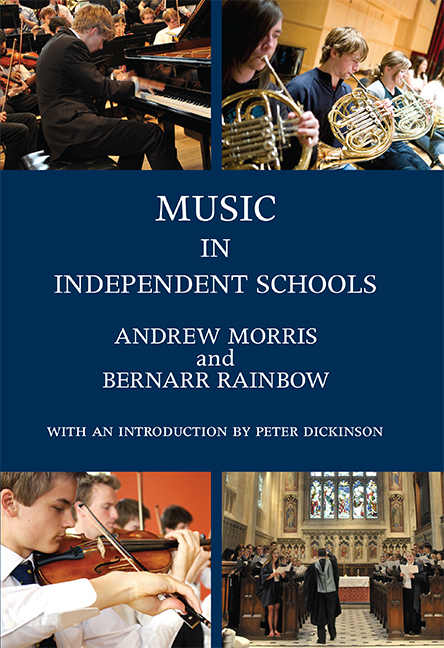Book contents
- Frontmatter
- Contents
- List of Plates
- General Editor's Foreword
- Editor's Introduction
- Biographical Notes
- List of Abbreviations
- PART I Studies from Music and the English Public School (1990)
- 1 Music and the English Public School: Early History
- 2 Visits to Various Public Schools in the Late Nineteenth Century: Sherborne, Uppingham, Harrow, Rugby, Clifton, Wellington, Eton, Winchester
- 3 Music in our Public Schools (1894)
- 4 The Topic Debated in Music & Letters: Answers to a Questionnaire Distributed by Editor A. H. Fox Strangways (1922)
- 5 The Oundle Phenomenon: Performances of Messiah and the B Minor Mass by the School (1922–3)
- 6 The Jubilee of the MMA (1952)
- 7 Public Schools and their Music (1927)
- 8 Boys and Music: Wellington, Harrow, Dulwich, Cheltenham, Marlborough (1936)
- PART II The New Millennium
- Index
- Appendix
7 - Public Schools and their Music (1927)
from PART I - Studies from Music and the English Public School (1990)
Published online by Cambridge University Press: 05 October 2014
- Frontmatter
- Contents
- List of Plates
- General Editor's Foreword
- Editor's Introduction
- Biographical Notes
- List of Abbreviations
- PART I Studies from Music and the English Public School (1990)
- 1 Music and the English Public School: Early History
- 2 Visits to Various Public Schools in the Late Nineteenth Century: Sherborne, Uppingham, Harrow, Rugby, Clifton, Wellington, Eton, Winchester
- 3 Music in our Public Schools (1894)
- 4 The Topic Debated in Music & Letters: Answers to a Questionnaire Distributed by Editor A. H. Fox Strangways (1922)
- 5 The Oundle Phenomenon: Performances of Messiah and the B Minor Mass by the School (1922–3)
- 6 The Jubilee of the MMA (1952)
- 7 Public Schools and their Music (1927)
- 8 Boys and Music: Wellington, Harrow, Dulwich, Cheltenham, Marlborough (1936)
- PART II The New Millennium
- Index
- Appendix
Summary
The upsurge of post-war activity reflected in the Music & Letters debate also produced a number of other publications devoted to the furtherance of music teaching in public schools. One notable example was a text book designed to provide a general music course for use in such schools. Entitled Musical Groundwork (1922) it was compiled by F. H. Shera, Director of Music at Malvern from 1916 until 1928, when he was appointed Professor of Music at Sheffield University. It was not widely adopted – because music was seldom given a place on the time-table and class teaching was not therefore possible.
Another book, incorporating ‘some suggestions on the possibilities of Music in Public, Preparatory and other Schools,’ was presented by Thomas Wood under the title Music and Boyhood, in 1925. Based on a series of articles written for the Music Teacher, it was an attempt to treat the problem of introducing music to the average public schoolboy rather than concentrating upon talented individuals. Wood had experimented on these lines while Director of Music at Tonbridge from 1919, and his book has a spirit of realism and common-sense which earned it wide readership among his peers. But for demands of space, it would have been reproduced in the present volume.
Instead, A. H. Peppin's Public Schools and their Music (London: Humphrey Milford, 1927) has been selected as more truly representative. Peppin's connection with public school music had begun in 1896 when he moved to Clifton from Mill Hill.
- Type
- Chapter
- Information
- Music in Independent Schools , pp. 109 - 199Publisher: Boydell & BrewerPrint publication year: 2014

